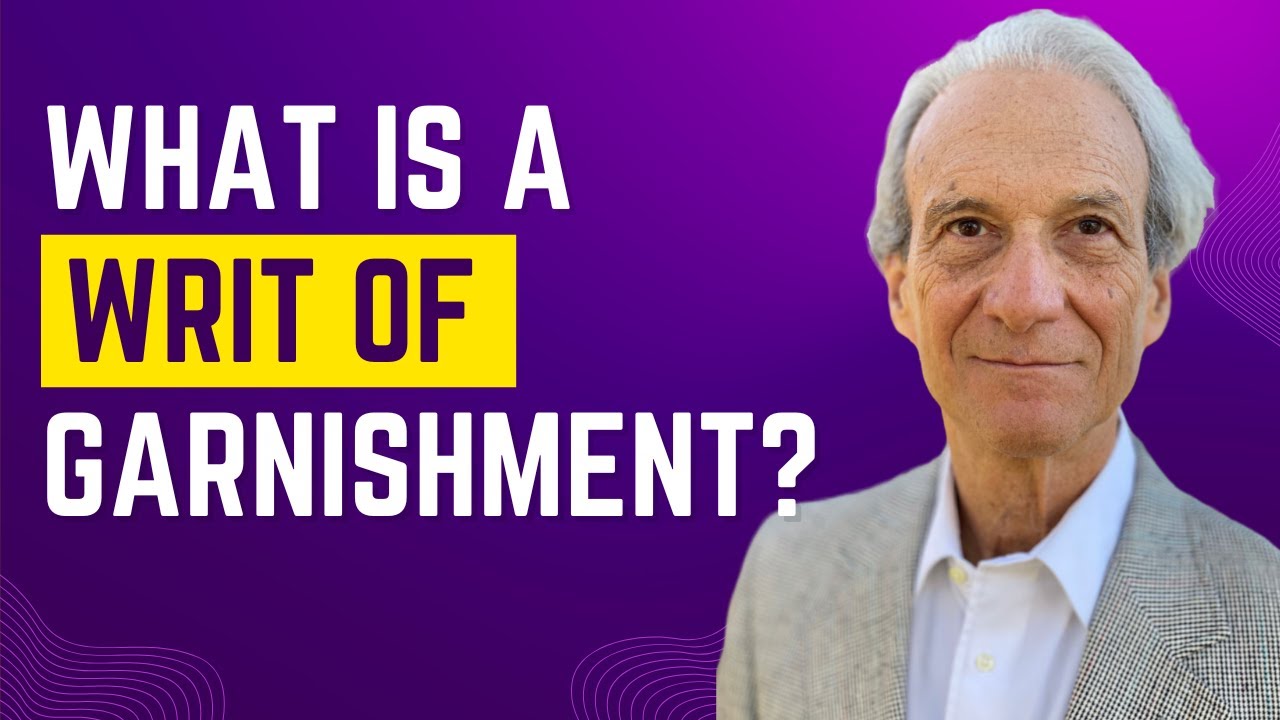Florida Writ of Garnishment Guide
What Is a Writ of Garnishment in Florida?
A Florida writ of garnishment allows creditors to take money directly from a debtor’s bank account or wages to satisfy a judgment.
Once a writ of garnishment is issued, the garnished funds are frozen and held until the court determines whether the creditor has the right to those funds. The debtor can try to remove the garnishment if the funds are exempt under Florida law.
How a Florida Writ of Garnishment Works
A creditor may obtain a writ of garnishment after the court enters a judgment and a writ of execution.
Florida garnishment statute section 77.041 imposes procedural rules and deadlines for the creditor, and it allows a judgment debtor to contest the garnishment. The statute provides that a creditor begins the garnishment process by filing a short motion with the court (“Motion for Writ of Garnishment”) and paying fees and deposits to the clerk of court. The clerk then issues the writ.
The judgment creditor is not required to seek a judge’s permission or a court order. Next, the creditor serves the writ upon the garnishee. The garnishee is the person or company that owes the judgment debtor money (for example, the debtor’s employer, bank, stockbroker, etc.).
Florida garnishment law requires the creditor to provide the debtor with a copy of the creditor’s motion, a copy of the Writ of Garnishment issued by the clerk of the court, and a Claim of Exemption form within five days of the clerk’s issuance of the writ, or within three days of service onto the garnishee, whichever is later.
We help protect your assets from creditors.
Jon Alper and Gideon Alper are nationally recognized experts in asset protection planning with over 50 years of combined experience. They provide all services remotely by phone or Zoom.

Florida Garnishment Statute
The Florida garnishment statute is found in Chapter 77 of Florida statutes. These laws set forth procedures, rules, and defenses of garnishments.
Creditors must strictly comply with all garnishment statutes, including properly completing and mailing legal papers and complying with several deadlines. The debtor may dissolve a writ of garnishment if there is a procedural defect in the creditor’s prosecution of the writ. Both creditors and debtors need to understand Florida’s detailed garnishment procedures.
Garnishee Response to Writ of Garnishment
The garnishee (such as a bank) must file an answer to the garnishment within 20 days. The garnishee’s answer states whether or not the garnishee holds any property or money belonging to the debtor. Within five days after service of the answer, the creditor must provide the debtor with a copy of the garnishee’s answer and a notice that the debtor has 20 days to move for a dissolution of the garnishment.
Sometimes, the judgment creditor does not believe the garnishee’s answer. For example, the answer may state that the garnishee is not indebted to the debtor or holds no property of the debtor, and the creditor believes otherwise. In that event, the creditor may challenge the garnishee’s answer to the writ by filing a reply denying, or traversing, the garnishee’s answer. The court will set the matter for a hearing to determine whether the garnishee’s answer is factually correct.
Exemptions to a Writ of Garnishment
Florida law exempts several types of debtor assets from writs of garnishment. Examples of Florida garnishment exemptions include a head of household exemption applicable to wage garnishment, or an exemption to garnishment of a bank account holding retirement distribution proceeds.
The garnishment statute includes procedures for a judgment debtor to claim his garnishment exemptions. The debtor must strictly follow these exemption procedures to defend against a writ of garnishment of exempt money.
When the judgment debtor believes garnished property is legally exempt from collection, the debtor can file with the court a claim of exemption. The filed claim of exemption may include an explanation or substantiation of the exemption. The garnishing creditor then has eight days from the date the debtor serves the claim of exemption by hand delivery, or fourteen days if served by mail, to contest the debtor’s claim of exemption. Florida law provides that the creditor’s objection to the debtor’s claim of garnishment exemptions must be based on facts asserted under oath.
In many cases, a creditor will voluntarily dissolve a garnishment upon receiving the debtor’s claim of exemption and documents from the debtor confirming the factual basis for the exemption. If the creditor contests the debtor’s claimed exemption, the court will set an evidentiary hearing to consider the debtor’s claim of exemption. The debtor can expedite the hearing by scheduling a hearing in coordination with the judge’s office and the creditor attorney. The debtor will have to present legal arguments and competent evidence supporting his exemption claim at this hearing.
The key thing to understand is that Florida garnishment exemptions are not automatic. If a debtor believes his exempt asset has been garnished, the debtor must timely file a claim of exemption.
Often, a creditor’s writ of garnishment suffers from procedural defects because the creditor did not strictly follow statutory rules of garnishment. The debtor can file a motion to dismiss, or dissolve, the writ of garnishment based upon the procedural defects in the creditor’s garnishment.
Tip: We advise our clients that exemptions must be claimed using the Claim of Exemption form. In our experience, i you do not file it in time you may lose the exemption.
Bank Account Garnishments
In Florida, bank account garnishments allow a creditor to collect unpaid debts by seizing funds directly from a debtor’s bank account. Creditors must first obtain a judgment before they can initiate a garnishment.
After securing a court order, the creditor files a writ of garnishment, which instructs the bank to freeze the debtor’s account. The funds remain frozen until the court determines whether they can be released to satisfy the debt.
What Happens When the Bank Is Garnished?
Bank accounts are a prime target of creditor writs of garnishments in Florida. Upon a bank’s receipt of a writ of garnishment, the bank will automatically freeze all bank accounts where the debtor’s name appears on the title of the account. Debtor bank accounts can contain exempt money such as retirement distributions, annuity distributions, or head of household wages.
Often, a debtor finds that exempt money held in a bank account is frozen by a judgment creditor’s writ of garnishment. This happens because creditors garnish banks, not bank accounts. A creditor may, without penalty, serve a writ of garnishment on any bank where the debtor maintains an account, even if a court later determines that one or more debtor accounts contain exempt funds.
Under Florida law, a debtor cannot hold a bank liable for damages because the garnishee bank froze an account holding money exempt from garnishment. The debtor must obtain a court order upholding the exemption and dissolving the garnishment.
How the Bank Account Garnishment Process Works
- Obtain a Judgment: The creditor must first sue the debtor in court and secure a judgment. Without a judgment, garnishment of bank accounts is not allowed under Florida law.
- File a Writ of Garnishment: Once the judgment is obtained, the creditor files a writ of garnishment targeting the debtor’s bank account. The court reviews the request and, if approved, issues the writ.
- Bank Freezes Funds: Upon receiving the writ, the bank must immediately freeze the funds in the account, up to the amount of the judgment.
- Debtor’s Right to Exemptions: The debtor is notified of the garnishment and has 20 days to claim any applicable exemptions, such as protected benefits or wages.
- Court Hearing (if necessary): If the debtor claims exemptions, the court may hold a hearing to determine if the funds are exempt. If there are no exemptions or if the court rules against the debtor, the funds are released to the creditor.
Can Creditors Garnish Joint Bank Accounts?
Yes, creditors can garnish joint bank accounts in Florida. However, the non-debtor account holder can try to prove that the funds in the account solely belong to them and not to the debtor. For example, if a married couple has a joint account but only one spouse is subject to garnishment, the other spouse can provide evidence that their earnings are separate to prevent the seizure of their funds.
How to Protect Bank Account Funds from Garnishment
Florida law offers several exemptions that may protect bank account funds from garnishment. These include:
- Head of Family Exemption: If a debtor is the head of a family and earns more than half of their income from a source supporting the family, their wages and certain bank account funds may be exempt.
- Protected Funds: Some types of funds—such as Social Security benefits, workers’ compensation, and retirement accounts—are exempt from garnishment.
- Filing an Exemption: To protect funds, a debtor must file a Claim of Exemption within 20 days of being notified about the garnishment.
Sign up for the latest information.
Get regular updates from our blog, where we discuss asset protection techniques and answer common questions.










